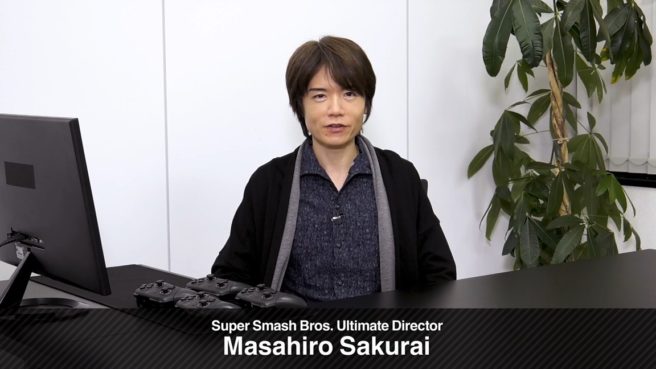Sakurai on how making things simpler doesn’t mean easier with competitive games
Super Smash Bros. director Masahiro Sakurai has still been publishing his bi-weekly columns in Famitsu, and we’re probably due for another one soon about Kazuya in Ultimate. In the meantime though, he’s been tackling some other subjects. One topic covered earlier this month is how making things simpler doesn’t necessarily mean easier when it comes to competitive games.
Below is our full translation:
In games where you’re pitted against another person, controls and rules can get very complicated. It’s not specific to any one genre, but taking fighting games as an example, remembering button combinations for different moves is in itself difficult. It makes things hard on beginners and can leave a bad taste in their mouths. I’m sure some might suggest simplifying game inputs as a possible solution to make games easier to play. While that sounds nice on paper, the reality is very different.
The more you simplify a game, the fewer opportunities there are for comebacks. That leaves beginners with almost no chance to win against someone more experienced as it leaves very little room for different tactics and creativity.
Imagine there’s a game where the only thing you can do is throw a single punch. Chances are the experienced player is going to win, as the number of strategies available to players is extremely limited. That might change if you could win through having a faster reaction time or using different button timings, but the fact is, the simpler the game, the most obvious the result is likely to be.
Above all else, that game would be boring! Party games might be different, but that wouldn’t make for a fun fighting game that could be enjoyed for years to come.
When compared to other fighting games, the Smash series has simple controls. Outcomes of matches are made unpredictable with items and stage gimmicks constantly interrupting the flow of a match. In competitive and online settings, players tend to prefer playing 1-on-1 on simple stages with no items, defeating the point I just made.
Of course, I think that’s a good thing. Players should be free to enjoy the game no matter what rules they choose. But I also feel that it would be unfortunate if it gave the impression that Smash is too hard to play.
Online was something we introduced to Smash out of necessity due to the times. Smash is better off played together at each other’s houses, determining who the king of the hill is. So I personally don’t think that Smash is suited to play that shows off on a global scale. But in Smash’s case, the players wanted it, so I abandoned my uncertainties.
In the end, no matter what the original rules are, if a player base gets large enough a game will appear ‘hard to get into.’ This is because the game’s controls and rules are the very essences of strategies and mind-games.
To play these games, it’s best to not try and master everything, but rather find things you understand and excel at and expand your skill set from there. This applies to any game, knowing what each button will do provides the basis for many advanced tactics and techniques.
Getting back to the idea of comebacks, skilled players are going to be skilled regardless. There’s no chance of winning without throwing a little something into the mix. And watching a one-sided match is no fun. I’m trying to learn about these trade-offs with a variety of games.
In Smash, Ryu’s Shoryuken was designed so that the command version is a little stronger than the simple input version of the move. In fact, it would be fitting to make it stronger than it is now, but that would mean those who can’t do the command input would lose more to those that can.
This is a simple example, but you can choose any playstyle you like. I hope everyone finds a playstyle they enjoy.
Big thanks to centurionnugget, Jarop, and Oni Dino for their assistance with this translation.
